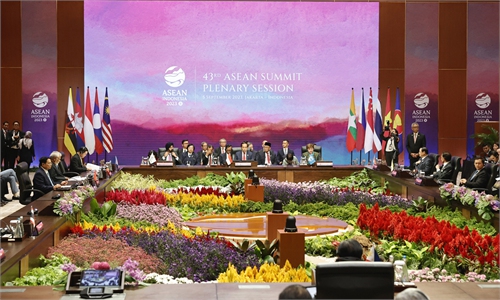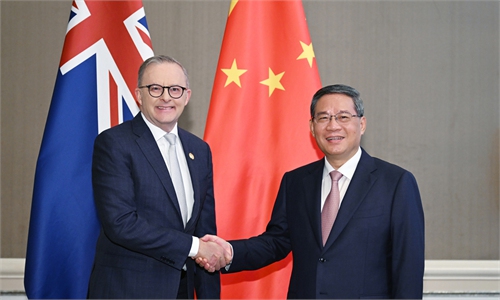
Illustration:Xia Qing/GT
US President Joe Biden's recent foreign policy agenda has sparked widespread discussion. Against the backdrop of his absence from the ASEAN Summit and related meetings, Biden is scheduled to visit Vietnam, one of the ASEAN member countries, on Sunday, with plans to elevate the bilateral relationship to a "strategic partnership," according to information released by the US. This move, putting Vietnam beyond ASEAN, reflects the essence of the US' Indo-Pacific Strategy.Despite the US government's repeated emphasis on supporting ASEAN's centrality in the regional architecture in its strategic documents, the reality shows that it's merely a token gesture to ASEAN. Since taking office, the Biden administration has spared no effort in reviving the Quad, establishing the AUKUS clique, and mediating between Japan and South Korea, relying on so-called like-minded allies. In practice, the US' Indo-Pacific Strategy marginalizes ASEAN, essentially bypassing it and building a "minilateral cooperation" mechanism centered on the US to directly serve US hegemony.
While snubbing ASEAN, the US is also dividing ASEAN. For instance, the Indo-Pacific Economic Framework for Prosperity launched by the Biden administration invited only seven ASEAN member countries, excluding the other three. Such differential treatment inevitably creates rifts within ASEAN. Biden's decision to prioritize Vietnam over ASEAN once again demonstrates the US' intention to divide ASEAN.
The upgrading of the US-Vietnam relationship is closely linked to the escalating tensions in the South China Sea. By enhancing its military presence in the Philippines, the US is increasingly intervening behind the scenes in the South China Sea issue, and disputes between China and the Philippines are showing signs of intensification. Indonesia, the rotating chair of ASEAN this year, has repeatedly expressed a desire to accelerate negotiations on the Code of Conduct in the South China Sea, which is something the US does not want to see. A calm South China Sea means the US has one less interface to meddle in regional affairs. Therefore, as one of the claimants in the South China Sea, Vietnam has become a target for US courtship. Washington aims to build a united front against China regarding the South China Sea issue by enhancing cooperation with the Philippines and Vietnam.
Ironically, the US practice of marginalizing and dividing ASEAN reveals a decline in its own influence. The strategic competition initiated by the US against China has squeezed the policy space of ASEAN countries and increased strategic pressure on regional nations. ASEAN leaders repeatedly emphasize that they refuse to "take sides" between China and the US. The US is well aware that ASEAN, as a whole, will not follow its lead on the issue of containing China. This has caused strategic anxiety in Washington.
The US itself is to blame for the current situation. On the one hand, influenced by domestic trade protectionism, the US is reluctant to open its market to ASEAN countries and opposes multilateral trade systems like RCEP or CPTPP.
On the other hand, the US tends to judge and differentiate its partners based on US own values, while most ASEAN countries do not necessarily align with the standards of US-style democracy. The US is neither able nor willing to make changes in these two aspects.
From this perspective, the US' courtship of Vietnam is merely a temporary measure. Earlier this year, Washington meddled in Hanoi's domestic affairs through its "Country Reports on Human Rights Practices" and faced criticism from Vietnamese officials.
A common consensus among ASEAN countries is that the US' Asia-Pacific policy lacks consistency. From the "Pivot to Asia" during the Barack Obama administration to Donald Trump's "America First" foreign policy, and now to the Biden administration's Indo-Pacific Strategy, ASEAN countries have become increasingly skeptical of US commitments.
In sharp contrast, China has consistently adhered to four "unswerving" principles in its relations with ASEAN: China will unswervingly take ASEAN as a high priority in its neighborhood diplomacy, unswervingly support ASEAN unity and ASEAN Community building. Furthermore, China will unswervingly support ASEAN centrality in the evolving regional architecture, and unswervingly support ASEAN in playing a bigger role in regional and international affairs.
It is evident that China's emphasis on ASEAN is fundamentally different from the US'. The attention paid by the US to ASEAN is in fact driven by the competition with China. China and ASEAN are geographically connected and have deep economic, social and cultural ties that cannot be severed. They should be strategic pillars for each other and work together to prevent a new cold war from occurring in Asia.
The author is an associate professor at the Institute of International Relations of China Foreign Affairs University. opinion@globaltimes.com.cn


